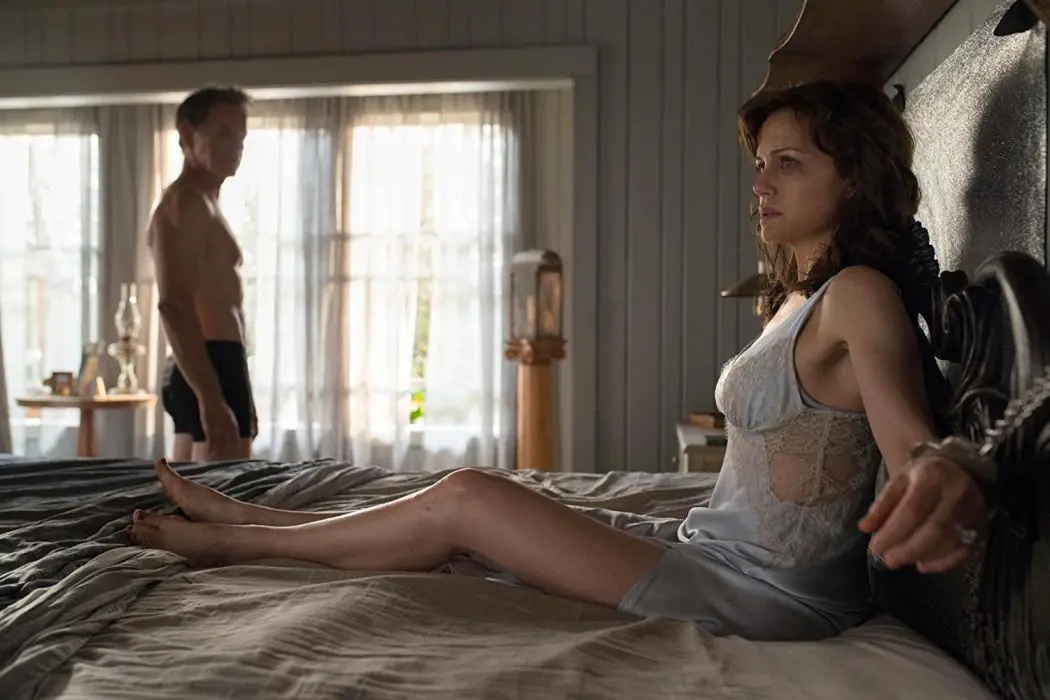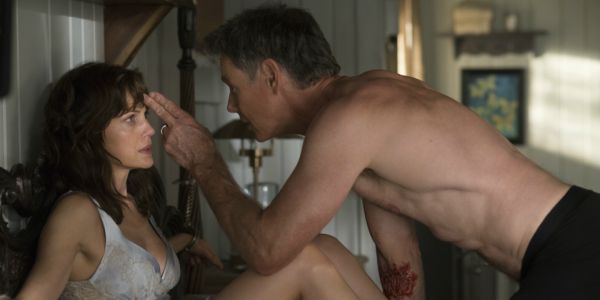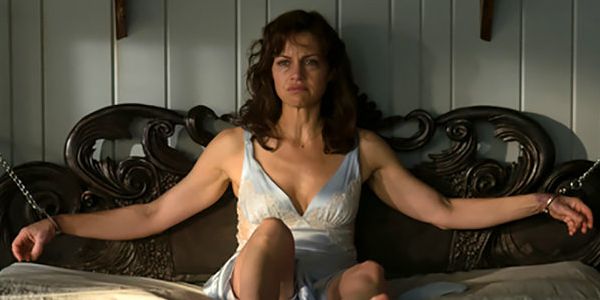GERALD’S GAME: Yet Another Exceptional King Adaptation

David is a film aficionado from Colchester, Connecticut. He enjoys…
2017 is shaping up to be a prominent year for Stephen King adaptations. Excluding the failure that was The Dark Tower, we now have two faithful and successful adaptations in a row: the wildly popular It and now the Netflix-streaming Gerald’s Game.
Based on a lesser-known King novel published in 1992, Gerald’s Game is the type of story that is not easily adapted to the screen, mainly due to its limited-character nature, extended inner monologues, and the fact that it is almost entirely set within one confined location. However, through Mike Flanagan’s careful interpretation and direction, it manages to be a gritty, entertaining psychological horror, although also one which stops just shy of its greater potential.
127 Hours Meets Misery
Gerald‘s Game focuses on Jessie (Carla Cugino) and Gerald Burlingame (Bruce Greenwood), a couple who travel to a remote house on a lake to get away from life for awhile. Soon at the house, after making their way to the bedroom, Gerald decides to spice things up a bit, and takes out a pair of real police-quality handcuffs, using them to attach Jessie’s arms to the twin posts of the bed. Jessie soon feels understandably uncomfortable, however, and decides she’d rather not be a part of this game, asking him to release her. Unfortunately, before Gerald has a chance to get the keys, he suffers a fatal heart attack and collapses, leaving her tied to the bed. Helpless and alone, the remainder of the film is Jessie’s desperate fight for survival.
As mentioned, the synopsis really does not lend itself nicely to a full-length feature. Even within the scope of a novel, such a story could and sometimes does get tedious. But through King’s extended inner monologues for Jessie, the story becomes imminently immersive instead, delving deep into the mind of a woman who was troubled long before she was forcibly attached to a bed. Flanagan takes these monologues and he applies them to hallucinations instead, with the thought being that Jessie is slowly starting to lose her mind and so is talking to voices that aren’t there. On one side of her soon appears a specter of her dead, cynical husband, while on the other, to contrast his negativity, emerges a stronger, more crafty version of herself.

Though at first I thought such a seemingly gimmicky concept would get old, it actually does work quite well for the film. King is known for his lengthy inner-thought character writing, and the lack of this in a visual format does make some of his adaptations suffer. But here, we get some really tightly-shot character exchanges instead, diving into such deep discussions as the nature of fear and the inescapable thought of death. These scenes also wouldn’t work as well as they do without the wonderful performances of both Gugino and Greenwood (especially Gugino, who manages to play both the distraught actual Jessie and her more confident persona with admirable distinction). The back-and-forth exchanges between the three, which also focuses on Jessie’s various methods for survival, make for some of the more engaging scenes in the film.
Scares, Both Real and Ingrained
One of the more terrifying images I remember reading in the book version of Gerald’s Game is at one point when Jessie is trapped in the room late at night, and she suddenly spots something sinister lurking in the corner, which she isn’t quite sure is real or just a manifestation of her troubled mind. Here, Flanagan both faithfully adapts that moment in addition to playing up the horrifying image visually. With a few camera tricks and some expert use of limited lighting and shadows, he shows only what you need to see. A majority of the film is shot in this way, for much of its length simply casting light on Jessie’s face in various ways to show the passing of time, but also to express her inner thoughts in symbolical ways.

One of the more memorable moments of Gerald’s Game comes when Jessie thinks back to her childhood, remembering something that she had long ago pushed to the back of her mind. She thinks back to when she once watched an eclipse as a 12-year-old girl, bathed in a rosy red, ethereal light, which (though occasionally appearing to be an obvious digital creation), is still a painful reminder of a beautiful moment that ended up being anything but. Flanagan manages to capture this very disturbing scene from the book with aplomb, and though he doesn’t quite get to as dark a place as King does, he does show what is minimally necessary.
This minimal showing does, though, seem to happen quite frequently throughout the film. King, unlike a lot of storytellers, isn’t afraid to bring you over that line, shoving your face in the muck and grime, forcing you to experience something horrifying through his words. And Flanagan never quite goes that far. Though it’s understandable that he didn’t want to exploit his characters in the same way as King, to me it felt like a bit of a cop-out. It shouldn’t have been necessary to show everything vividly, including in the eclipse scene, but what he does detract makes the story seem much more tame and safer than it should have been. And, following this scene, the film loses even more if its steam.

As you would most likely guess, Jessie, though helpless at first, eventually tries various methods to escape from her plight of being handcuffed to the bed, the ideas of which are often given to her through her advice-giving alter-ego. Finally at the end of her rope, she eventually tries a very risky procedure, which then becomes a nail-bitingly intense sequence that might make some people turn away. Just as soon as it had started, though, it ends. Much as before, Gerald’s Game goes to that line, but it doesn’t quite take the risk of going over it. For me, it was a bit of shame to see such a seemingly valiant attempt fall short.
Redemption
Much of the criticism that I have seen aimed at Gerald’s Game has to do with its overly saccharine ending. The pieces line up just a bit too conveniently, and the film delves into a side-story that is seemingly unrelated to the previous plight for survival. I don’t share this same criticism, though.
Not only accurate to the novel, it is also a clever way for Flanagan to tie together all of the loose ends of the story in an even more fitting way, casting light on the film’s principle theme: that of escaping from your own inner demons. This final moment is necessary because it is triumphant and hopeful, and for a film dealing with the horrific subject of past childhood trauma, that, to me, is an admirable way to give closure. After all, eclipses don’t last forever.
Gerald’s Game: Conclusion
To conclude, Gerald’s Game is a mostly faithful, almost entirely enjoyable adaptation of King’s novel. Though it doesn’t quite go to as dismal a place as the original story, it is still enticing in its own right, showcasing powerful themes in addition to Flanagan‘s clear talent for horror film-making. Between this and It, it’s looking like a good year to be Stephen King. Let’s hope that future adaptations continue to follow suit.
What do you think of Gerald’s Game? What are your favorite Stephen King adaptations?
Gerald’s Game is now available on Netflix.
Does content like this matter to you?
Become a Member and support film journalism. Unlock access to all of Film Inquiry`s great articles. Join a community of like-minded readers who are passionate about cinema - get access to our private members Network, give back to independent filmmakers, and more.
David is a film aficionado from Colchester, Connecticut. He enjoys writing, reading, analyzing, and of course, watching movies. His favorite genres are westerns, crime dramas, horror, and sci-fis. He also enjoys binge-watching TV shows on Netflix.













